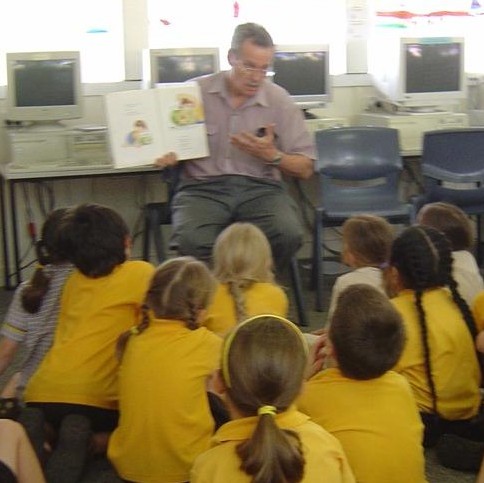Promoting Reading
The library plays a pivotal role in the students’ literacy development. According to the aims listed in the Resource Centre Guide, the library will offer students ‘opportunities to develop an interest in, and enjoyment of literature’ and the ability to ‘follow up personal interests and hobbies’.
2008 Students see the TL as an expert in literature, while teachers see him as an expert in Accelerated Reader. (1.3.2) In library lessons, the TL prioritises support of the Accelerated Reader (AR) Program. He emphasises the importance of personal communication with students about their reading progress (timely, accurate feedback), and ensuring that students select reading materials that challenge and extend their reading skills. The focus on Accelerated Reader has created an unbalance library program. Not only is it skewed towards promoting reading, it focusses almost entirely on Accelerated Reader. For some classes, Book Week is the only time of year that the TL promotes literature by sharing books with the class.  Read more about ...
Accelerated Reader REFLECTION A more balanced program incorporating information literacy, ICT literacies and a love of literature would better equip students to become lifelong learners. In addition, the small collection of non-AR quality fiction needs to be promoted amongst staff and students. And the picture book section needs revitalising by expanding the collection and designing age-appropriate displays. Activities such as book raps, readers' circles and literature related competitions will also stimulate students' interest in reading. (1.3.2) | 2011 My expertise lies in curriculum development and ICTs. Consequently I felt that it was important that I get to know the collection and learn more about contemporary trends in children's literature and strategies for promoting reading and litercy in general. To get to know the collection I spent time each week shelving the returns and I set myself a goal of reading at least 3 books a week in Semester 1. To find out about trends in children's literature I talked to students about what they liked to read and why. The Robert Muchamore Cherum series and fantasy fiction books are very popular with the upper school students. The Preps love Charlie and Lola and the Year 2 boys are into Star Wars and Zac Power. The Fairy book series by Meadows are popular with a range of age groups. Strategies for promoting literacy and reading that I have investigated and trialled included Reader's Cup, The Courier Mail Spelling Bee, the Ipswich Poetry Feast poetry competition and author visits. Strategies for promoting literacy and reading that I have investigated and trialled included Reader's Cup, The Courier Mail Spelling Bee, the Ipswich Poetry Feast poetry competition and author visits. REFLECTION The school already has a very strong reading culture. Lower school students are eager to get to Year 3 so that they can start doing Accelerated Reader. Upper school students who come from other schools generally embrace the program with enthusiasm and tell us how much better the reading program at our school is compared to their previous schools. Parents value being able to track their children's progress using Home Connect and email alerts. While a number of students enjoyed the other initiatives that I trialled this year, each of these intiatives seemed to cater for a small percentage of the student population compared with the broader appeal of Accelerated Reader. |
References
Renaissance Learning. (2008). Accelerated Reader Enterprise. Retrieved October 6, 2008 from http://www.renlearn.com/ar/
RMIT University. (1999). “The Impact of the Accelerated Reader® Pilot Program in Australia: Extract from a Research Project Conducted by RMIT University” Renaissance Learning Australia Pty Ltd, Ashwood, Victoria. Retrieved October 6, 2008 from
http://research.renlearn.com/research/pdfs/60.pdf